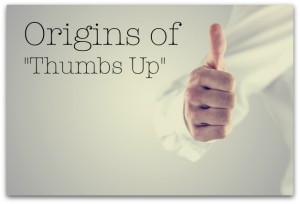Uncle John knows pretty much everything—and if he doesn’t, he heads his massive research library, or puts one of his many associates on the case. So go ahead: In the comments below, ask Uncle John anything. (And if we answer your question sometime, we’ll send you a free book!)
What’s the origin of the “thumbs up” gesture?

You may have heard this story, and been told it’s the origin of the common “thumbs up” and “thumbs down” gestures. But it’s not true. Roman emperors never did that—the gladiator was almost always sentenced to death anyway. The idea that the gestures came frome Rome dates to the popular 1872 painting Pollice Verso by French painter Jean-Leon Germome. It depicts a gladiator receiving a thumbs-down from an emperor in his luxury box at the battles. The thumbs down was taken from this, and the meaning of thumbs up was extrapolated.
There are two far more likely origins fur the gesture. In medieval Europe, businessman would make the gesture at each other to approve a deal or a sale, the era’s equivalent of an oral agreement of “handshake deal.” In World II, the Flying Tiger brigade of American pilots was based in China. Supportive locals showed their thanks to the pilots by giving them a thumbs up, which is a Chinese gesture that means literally “number one” and figuratively “nice job.” Pilots throughout the U.S. and allied military adopted it, where it became a “ready to go” visual gesture to ground crew that they were ready for takeoff from aircraft carriers.
However, this does not mean “I approve!” or “hello, friend!” or “Siskel and I liked this movie” in the Middle East, West Africa, or South America. In these places, the thumbs up is an offensive gesture that means, roughly, “up yours.”







